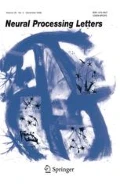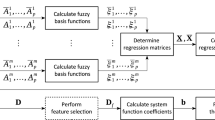Abstract
In this paper, the ability of fuzzy systems is used to estimate the solution of crisp optimal control problems. To solve an optimal control problem, first the well-known Euler–Lagrange conditions are obtained and then, the solution of these conditions is approximated by defining a trial solution based on fuzzy systems. The parameters of fuzzy systems are adjusted by an optimization algorithm. Numerical examples and comparisons with exact solutions reveal the capability and accuracy of proposed method.





















Similar content being viewed by others
References
Rubio JE (1986) Control and optimization, the linear treatment of nonlinear problems. Manchester University Press, Manchester
Geering Hans P (2007) Optimal control with engineering applications. Springer, Berlin
Kirk DE (1970) Optimal control theory, an introduction. Dover Publications, Mineola, NY
Krabs W, Pickl S (2010) An optimal control problem in cancer chemotherapy. Appl Math Comput 217:1117–1124
Kirk DE (2004) Optimal control theory-an introduction. Dover Pub. Inc., New York
Lewis F, Syrmos VL (1995) Optimal control. Wiley, New York
Modares H, Naghibi MB (2011) Sistani solving nonlinear optimal control problems using a hybrid IPSOSQP algorithm. Eng Appl Artif Intell 24:476–484
Hilscher RS, Zeidan V (2012) HamiltonJacobi theory over time scales and applications to linear-quadratic problems. Nonlinear Anal 75:932–950
Berkani S, Manseur F, Maidi A (2012) Optimal control based on the variational iteration method. Comput Math Appl 64:604–610
Garg D, Patterson M, Hagera WW, Raoa AV, Bensonb DA, Huntington GT (2010) A unified framework for the numerical solution of optimal control problems using pseudo-spectral methods. Automatica 46:1843–1851
Clever D, Lang J, Ulbrich S, Ziems JC (2010) Combination of an adaptive multilevel SQP method and a space-time adaptive PDAE solver for optimal control problems. Procedia Comput Sci 1:1435–1443
de Oliveira VA, Silva GN, Rojas-Medar MA (2009) KT-invexity in optimal control problems. Nonlinear Anal 71:4790–4797
Gerdts M (2008) A non-smooth Newton’s method for control-state constrained optimal control problems. Math Comput Simul 79:925–936
Buldaev AS (2008) Perturbation methods in optimal control problems. Ecol Modell 216:157–159
Salama AA (2006) Numerical methods based on extended one-step methods for solving optimal control problems. Appl Math Comput 183:243–250
Zhou YY, Yangb XQ, Teob KL (2006) The existence results for optimal control problems governed by a variational inequality. J Math Anal Appl 321:595–608
Chryssoverghi I, Coletsos I, Kokkinis B (2006) Discretization methods for optimal control problems with state constraints. J Comput Appl Math 191:1–31
England R, Gomez S, Lamourc R (2005) Expressing optimal control problems as differential algebraic equations. Comput Chem Eng 29:1720–1730
Rodriguez A (2004) On the local stability of the solution to optimal control problems. J Econ Dyn Control 28:2475–2484
Nik H Saberi, Effati S, Shirazian M (2012) An approximate-analytical solution for the Hamilton-Jacobi-Bellman equation via homotopy perturbation method. Appl Math Modell 36:5614–5623
Cheng T, Sun H, Qu Z, Lewis FL (2009) Neural network solution for suboptimal control of non-holonomic chained form system. Trans Inst Meas Control 31(6):475–494
Cheng T, Lewis FL (2007) Neural network solution for finite-horizon H-infinity constrained optimal control of nonlinear systems. J Control Theory Appl 5:1–11
Cheng T, Lewis FL, Abu-Khalaf M (2007) Fixed-final-time-constrained optimal control of nonlinear systems using neural network HJB approach. IEEE Trans Neural Netw 18:1725–1737
Vrabie D, Lewis F (2009) Neural network approach to continuous-time direct adaptive optimal control for partially unknown nonlinear systems. Neural Netw 22:237–246
Effati S, Pakdaman M (2013) Optimal control problem via neural networks. Neural Comput Appl 23:2093–2100
Li-Xin W (1997) A course in fuzzy systems and control. Prentice Hall PTR, Upper Saddle River
Shirazian M, Effati S (2012) Solving a class of nonlinear optimal control problems via He’s variational iteration method. Int J Control Autom Syst 10:249–256
Maidi A, Pierre J (2012) Corriou optimal control of nonlinear chemical processes using the variational iteration method. In: 8th IFAC symposium on advanced control of chemical processes. Furama Riverfront, Singapore, July 10–13, pp. 898–903
Burghes DN, Graham A (2004) Control and optimal control theories with applications. Woodhead Publishing, Chichester
Acknowledgments
The authors are thankful to the unknown referees for their valuable and informative comments that have significantly improved the quality of the paper. They also appreciate the Editors and Editor in Chief for their valuable suggestions.
Conflict of interest
The authors declare that they have no conflict of interest.
Author information
Authors and Affiliations
Corresponding author
Rights and permissions
About this article
Cite this article
Pakdaman, M., Effati, S. Approximating the Solution of Optimal Control Problems by Fuzzy Systems. Neural Process Lett 43, 667–686 (2016). https://doi.org/10.1007/s11063-015-9440-7
Published:
Issue Date:
DOI: https://doi.org/10.1007/s11063-015-9440-7




